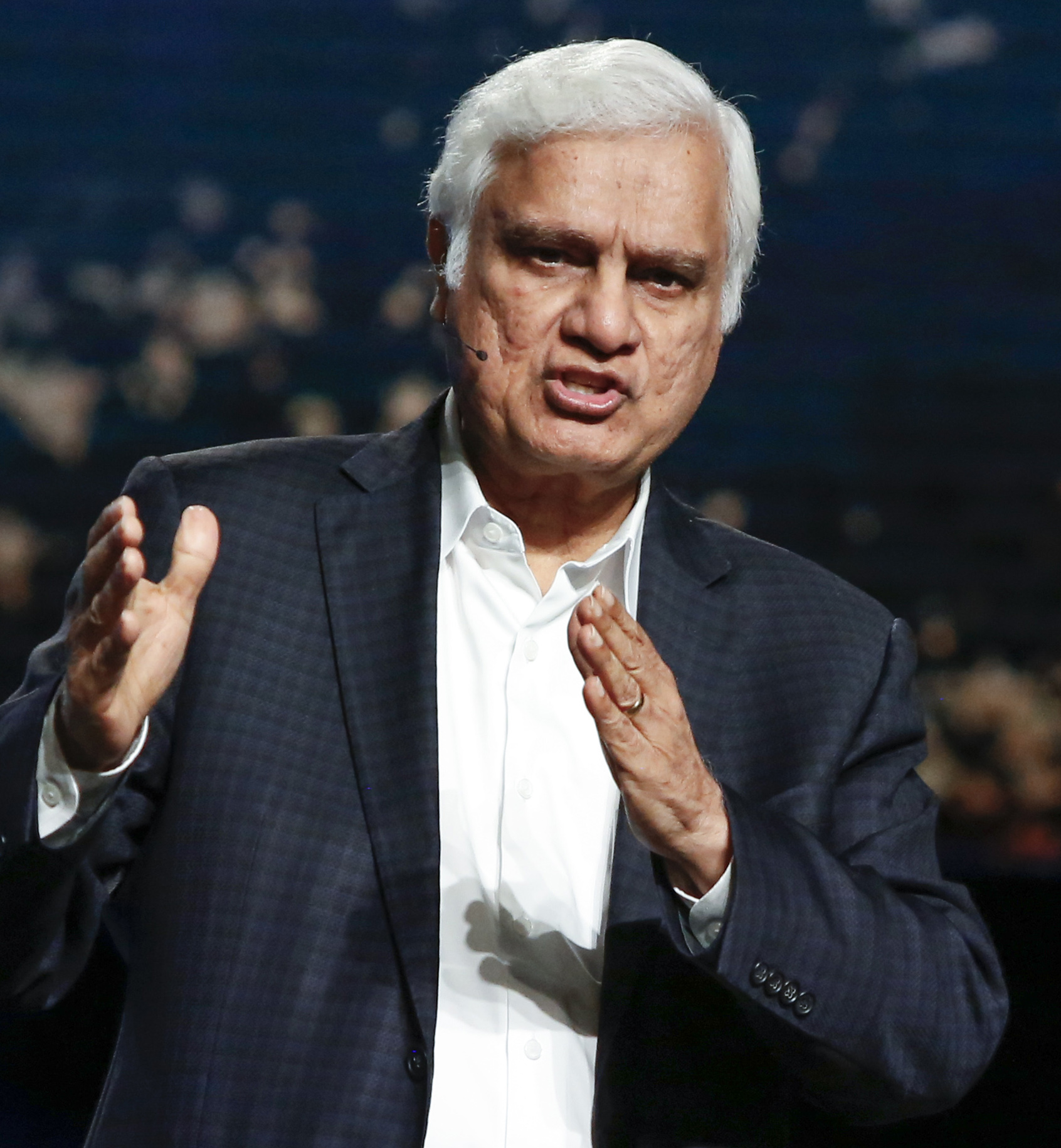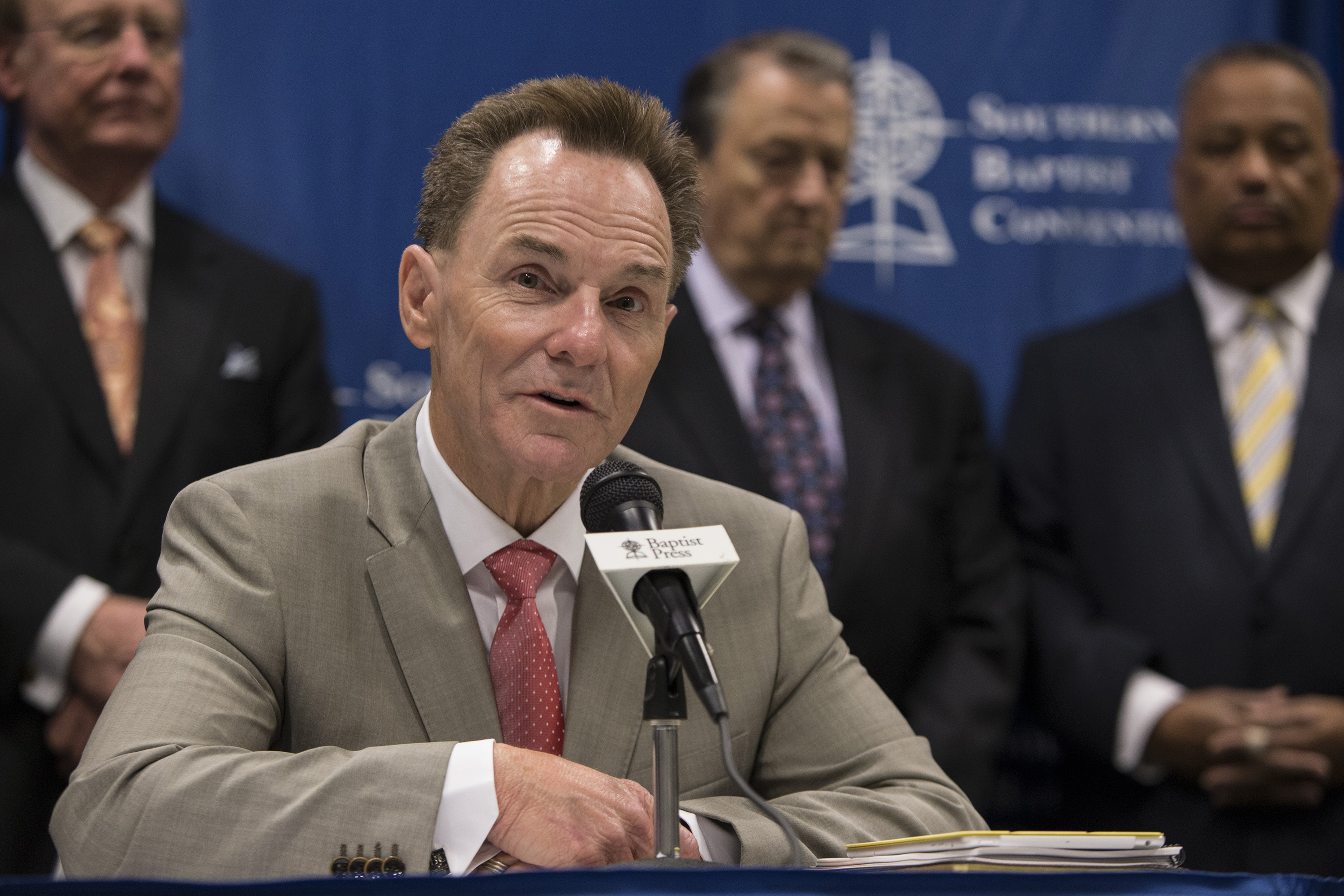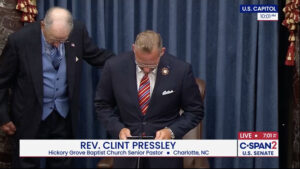
NEW YORK (AP) — A posthumous sexual misconduct scandal involving its founder and namesake has placed Ravi Zacharias International Ministries in a wrenching predicament. The organization faces calls from within its own ranks to change its name, pay reparations to any victims and oust some top leaders, including Zacharias family members.
Zacharias died of cancer in May at age 74. One measure of his stature in Christian circles: Vice President Mike Pence spoke at his memorial service, lauding him as a great evangelist “armed with intellect, girded with truth and love.” Zacharias also addressed the 2018 Southern Baptist Convention Annual Meeting in Dallas.
He founded his international ministry, known as RZIM, in 1984, with a mission to engage in Christian apologetics — defending Christianity with intellectual arguments. Based in suburban Atlanta, RZIM has operations in about 20 countries and a roster of scores of traveling speakers.
In recent months, the organization has been plunged into crisis, precipitated by a Sept. 29 article in Christianity Today asserting that over a period of about five years, Zacharias sexually harassed three women who worked as massage therapists at two day spas he co-owned in an Atlanta suburb.
RZIM’s leadership initially challenged the claims, asserting that the allegations “do not in any way comport with the man we knew for decades — we believe them to be false.”
However, RZIM hired an Atlanta law firm, Miller & Martin, in October to conduct an independent investigation.
Completion of the report, and its promised public release, is still weeks away. But on Dec. 22 the law firm submitted an “interim update” to RZIM’s executive committee, which made it public the next day.
The law firm summarized its investigation, which included dozens of interviews, as well as review of documents and electronic data. In the process, the firm said, “We have found significant, credible evidence that Mr. Zacharias engaged in sexual misconduct over the course of many years.”
“Some of that misconduct is consistent with and corroborative of that which is reported in the news recently, and some of the conduct we have uncovered is more serious,” it added. “Our investigation is ongoing, and we continue to pursue leads.”
In disclosing the interim findings, the RZIM executive committee members described themselves as heartbroken and expressed remorse on behalf of those victimized by Zacharias.
The disclosures already have had tangible impact. Several radio outlets, including Moody Radio — one of the largest Christian networks in the U.S. — have dropped RZIM programs. Some booksellers have pulled Zacharias’ books from their offerings. In Britain, a network of student-led mission teams operating on university campuses has asked RZIM-affiliated speakers to withdraw from upcoming events.
LifeWay Christian Resources was among those merchants removing RZIM materials from their inventory. LifeWay spokesperson Carol Pipes confirmed to Baptist Press that the decision was made “based on the allegations that have been widely reported.”
There has been heavy pressure on RZIM from its British affiliate, the Zacharias Trust. In a letter to its staff on Dec. 23, the trust’s board members said they were urging the U.S. leadership to issue a “profound apology” to any victims and commit to “reform radically the governance, leadership and accountability of the RZIM organization.”
RZIM spokesperson Ruth Malhotra told The Associated Press that the organization’s senior leaders, including CEO Sarah Davis — who is Zacharias’ eldest daughter — and President Michael Ramsden, were declining to grant interviews until after the law firm’s investigation concludes.
Davis, in an email obtained by the AP, wrote to RZIM staff on Dec. 23 acknowledging that the developments were likely to have caused “grief, confusion, disillusionment and anger” and asking that they refrain from speaking to the media while the investigation is underway.
However, several employees have made clear in social media posts and in letters that have been shared publicly that they are dismayed with the leadership’s handling of the scandal. They say the leaders have discussed the option of “rebranding,” which would likely entail a change of the organization’s name, but the employees are pressing for additional steps, including reparations and a leadership overhaul.
Among them is Carson Weitnauer, a specialist in online outreach for RZIM’s Zacharias Institute. Writing on his blog, he said his faith in the organization’s leadership has been shattered.
“The realization that Ravi Zacharias was not the greatest apologist of his generation — but rather one of its greatest frauds — has felt like a catastrophic betrayal,” Weitnauer wrote. “I have felt a sickening combination of revulsion and grief.”
RZIM staff members “have been badly misled by our secretive board and senior leaders,” he continued. “RZIM must change its name, remove Ravi’s material, repent for its many failures, and provide a restorative response to the harm that Ravi’s victims experienced.”
In a follow-up post, Weitnauer asked if the board would resign “to acknowledge their failure to provide accountability to Ravi Zacharias for more than a decade.”
Also going public with criticism was Max Baker-Hytch, a philosophy instructor at the University of Oxford who has worked for several years with RZIM’s Oxford Center for Christian Apologetics in Britain.
In a pair of letters to RZIM board members, which he later shared with the AP, Baker-Hytch faulted the board for lack of transparency and urged it to release internal governance information, such as the names and salaries of senior officials. Such information about nonprofits is normally accessible to the public via IRS Form 990s, but RZIM has not disclosed a Form 990 since 2015; Malhotra said it became exempt from filing after asking the IRS to reclassify it as “an association of churches.”
“The board’s continued secrecy, not only to the employees they oversee, but also to the public who rightly want full accountability, has irreparably damaged the board’s credibility,” Baker-Hytch wrote Dec. 20. “The only way I can see the public credibility of this organisation being restored is for there to be a brand-new Global Board of Directors and Global CEO, none of whom are Zacharias family members, and to file Form 990s … for the years they haven’t been filed.”
RZIM’s Form 990 for 2015 reported that nearly all its revenue came from contributions and grants, which totaled $24.6 million. Zacharias’ wife Margaret is listed as vice chairman of ministry; their eldest child, daughter Sarah Davis, as executive director; and their youngest, daughter Naomi Zacharias, as vice president for a grant-making division called Wellspring International.
Zacharias had been entangled in some previous controversies over how he had publicly described his academic credentials and over his claim, later challenged in legal proceedings, that he was the target of an extortion scheme related to sexting and sexually explicit photos.
Weitnauer and Baker-Hytch said the RZIM board was too credulous in accepting Zacharias’ version of the sexting case and too dismissive of claims by the woman he accused, Lori Anne Thompson. She contends that Zacharias groomed her to participate in secretive communications that eventually included sending nude photos of herself.
Zacharias dropped his extortion lawsuit in November 2017, and the parties eventually reached a private settlement.
In a statement posted online Dec. 23, Thompson and her husband thanked RZIM employees who questioned the organization’s handling of the case.
“We were targeted, groomed, exploited, malevolently litigated against, falsely accused as elaborate extortionists,” the statement said. “Apologies should be as far reaching as the damage.”
From The Associated Press. May not be republished. AP religion coverage receives support from the Lilly Endowment through The Conversation U.S. The AP is solely responsible for this content.























